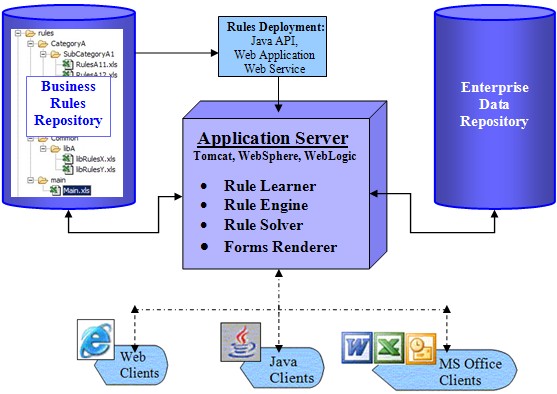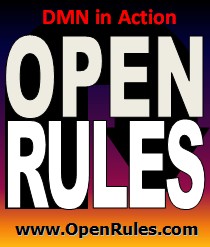Open Your Business Rules!
Rules-based
Operational Decision Services
Web Applications with OpenRules
Along with basic rule services incorporated in any Java application, you can create two major types of Web applications:
Major components of such applications are presented on the following architectural picture:

OpenRules allows you to
develop complex Web applications without being an expert in
various Web development techniques. Using the commonly known
Excel interface, you can define your business logic
in a form of Excel-based business rules and make them
available as fine-grained Web services. Then, you may define
your presentation logic using Excel-based
web forms with associated interaction rules. Being
deployed as a presentation-oriented Web application, it will
invoke the related rule services whenever necessary.
Frequently, such a service-oriented approach to web
application development also involves a workflow engine that
uses a publish/subscribe paradigm for automatic invocation
of different web services.
Here are links to the different OpenRules components that can be available from an Application Server with OpenRules:
Service-oriented Web Applications. A service-oriented Web application implements the endpoint of a fine-grained Web service. If your system is based on Service-oriented architecture, you will probably prefer to treat business rules as a special type of loosely coupled web services that support your decision making processes. We will use the term "Rule Service" for business rules deployed as a web service. With OpenRules you define and maintain your business rules using a combination of Excel, Java, and Eclipse. You may test your rules as a stand-alone application or execute them locally using a simple Java API. However, when you are ready to integrate your business rules into an enterprise level application, OpenRules provides a "push-button" mechanism for deployment of business rules as Web Services.
Presentation-oriented Web Applications. A presentation-oriented Web application generates dynamic Web pages containing various types of markup language (HTML, XML, and so on) in response to requests. The most popular Web components are either Java Servlets, JSP, Struts or JSF. They use Java programming language to dynamically process requests and construct responses in a form text-based markup such as HTML and XML. All these techniques are oriented to experienced software developers that seriously limits business analysts participation in design and maintenance of business interfaces.
Being functionally similar to the JSP technology, OpenRules provide a much more intuitive and simplified way to create dynamic web content. Creators of intelligent web interfaces do not have to know HTML, JScript or Java. They will use only a commonly known Excel interface. A non-technical user can define complex web form layouts and the associated interaction logic in simple Excel tables. Forms presented in MS Excel spreadsheets are automatically translated into HTML pages without limitation on the expressiveness of HTML. A user can use the power of decision tables to define complex relationships between fields inside web pages and/or between different pages. Based on user input and previously entered information, the forms content and presentation sequence can be changed dynamically during the interaction process.
Web applications created with OpenRules can be deployed on any Java Application Server such as WebSphere, WebLogic or Apache Tomcat. OpenRules provides a push-button solution for cumbersome web application configuration and deployment tasks. OpenRules provides a detailed User's Guide and multiple examples of rule services used by presentation-oriented Web applications.

